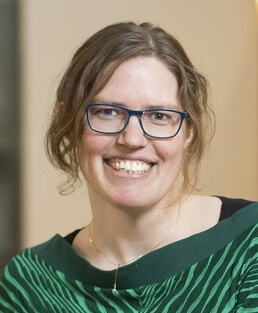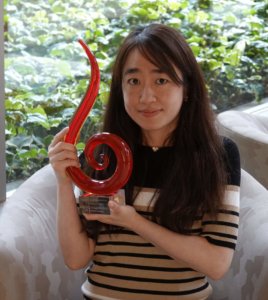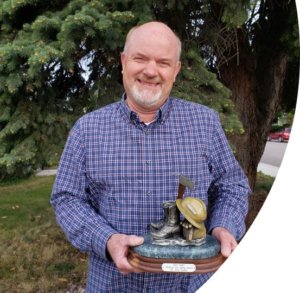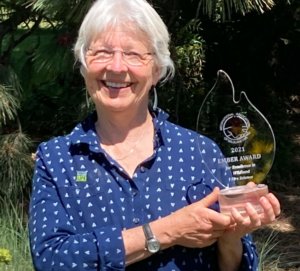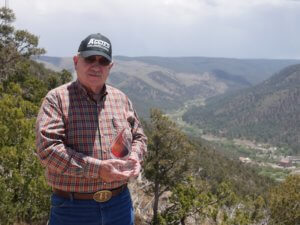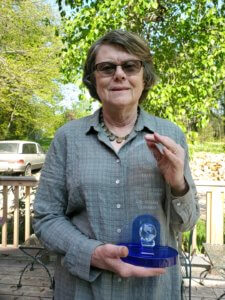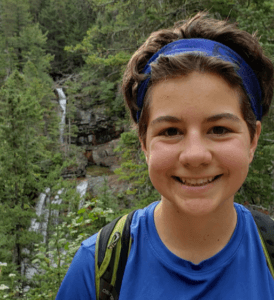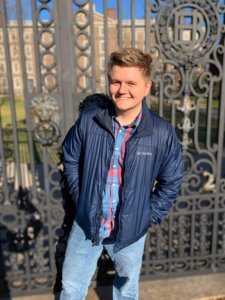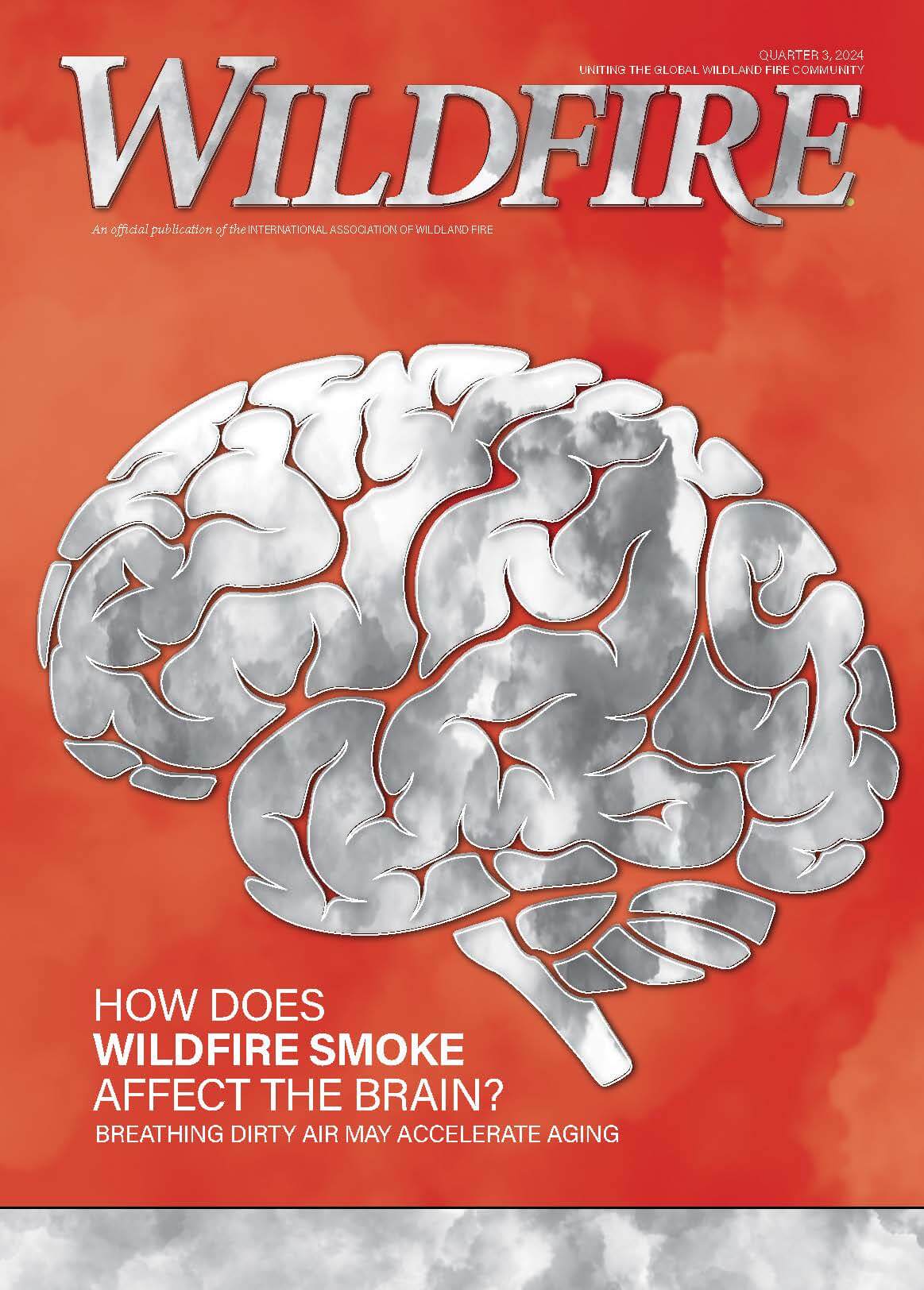2021 IAWF Awards
Early Career Award in Fire Science
Cathelijne Stoof
Cathelijne Stoof is a highly versatile interdisciplinary researcher, already a leader in wildland fire science, and a role model for scientific communications and women in science.
Stoof was initially well known for her outstanding PhD work on fire impact on soils; her research has now extended to environmental impacts, including greenhouse gas emissions, bioenergy, soil-water-plant ecology, and agronomy interactions. Based on Stoof’s wide-ranging accomplishments, she received a prestigious Marie Curie Fellowship for her research and was shortlisted as one of 22 inspiring women at Wageningen University.
Stoof is well regarded and highly cited by the scientific community. Her publication record includes 117 journal and conference papers that, according to Google Scholar, have attracted more than 1,400 citations (at a current rate of 320 citations per year).
Stoof has been instrumental in leading the scientific community, policy, and practitioners to recognize that climate change is impacting the fire regimes of countries that were previously considered safe from wildfires. As part of this work, Stoof founded and leads the Wageningen Fire Centre to bring together researchers and stakeholders from various disciplines to tackle the diverse issues of fire within non-traditional fire prone countries.
Most recently, Stoof brought together and led a diverse group of academics and practitioners from across Europe to create a research proposal about her vision for living with fire. The project, called PyroLife, wants to tackle the increasing challenges of wildfire in temperate and Mediterranean regions by bringing together a diverse set of disciplines, from engineers to ecologists to social scientists, all engaged in risk quantification, governance and risk communications, and the many disciplines in between.
As a result of this exceptional leadership and vision, PyroLife was awarded a €4 million grant in 2019 to train 15 PhD students from the Marie Curie International Training Network.
Early Career Award in Fire Science
Sayaka Suzuki
Sayaka Suzuki, PhD, of the National Research Institute of Fire and Disaster (NRIFD), Japan, is well known for crucial research on wildfire spread into and through communities. Suzuki is a leader in linking the traditional building and wildland fire science fields, and is a role model for women in combustion and fire -science research.
Regarded as a leading expert in firebrands, Suzuki has written more than 30 journal papers focusing on understanding outdoor fire spread by firebrands.
As a board member of the Japanese Combustion Society, Suzuki is making headway into recruiting more women researchers in fire research in Japan. Suzuki has led the development of young researcher workshops at the society’s annual meetings, and hosts luncheons at which young women can join and discuss how a career in fire research can be rewarding.
Further evidence of Suzuki’s leadership is her role as the main liaison for the workshop series known as Operation Tomodachi – Fire Research. Tomodachi means friendship in Japanese. In Suzuki’s role in this workshop series, she served to bridge the vast cultural differences as well as communication difficulties between American and Japanese fire researchers.
Wildland Fire Safety Award
Bret Butler
Bret Butler, a research mechanical engineer with the USDA Forest Service based at the Rocky Mountain Research Station’s Missoula Fire Sciences Laboratory, has been working in the field of wildland fire science for 30 years, since the completion of his PhD.
Butler’s primary research and technology transfer efforts have focused on improving wildland firefighter safety. Among some of Butler’s accomplishments are the preparation of a seminal case study of a major fatality wildfire; serving as a serious accident investigation team member; the development of a model for simulating wind speed and direction in mountainous terrain for use in predicting fire behavior; involvement in co-ordinating several IAWF Wildland Fire Safety Summits and international fire safety short courses; authorship of numerous peer-review journal articles and conference papers; and research and development of guidelines for specifying the desired characteristics of firefighter safety zones.
Ember Award
Penny Morgan
The IAWF Ember Award recognizes and acknowledges sustained achievement in wildland fire science.
Penny Morgan, PhD, has achieved excellence in wildland fire research, teaching, education, outreach, and technology transfer, and has consistently demonstrated creative thinking innovation, exploration, and information dissemination throughout her more than 35-year career.
Morgan’s focus and specialization in fire ecology and management, landscape ecology, and natural resources ecology and conservation biology have yielded ground-breaking accomplishments, established new programs, increased collective knowledge, and set the groundwork for dramatically improved awareness of the importance, role, and application of knowledge of these disciplines.
Morgan’s contributions include scholarly advancements, education/teaching achievements, outreach inputs, and support to professional organizations and community service. Some of her most notable achievements include:
- a highly praiseworthy publication record including more than 85 peer-reviewed journal articles
- mentoring more than 40 PhD and Master’s students, 10 senior thesis students, and more than 150 undergraduates
- leadership in the development of the BSc and master’s degree programs in fire ecology and management in the United States.
While Morgan has had a profound effect on the wildland fire science community, it is also important to emphasize that she began her career as one of a handful of women pursuing careers in fire science. Since then, Morgan has promoted and led the advancement of women as well as all others in fire science; she was the first woman to receive the AFE Biswell Lifetime Achievement Award.
Firebreak Award for Excellence in Fire Management
Arthur (Butch) Blazer
Arthur (Butch) Blazer’s many achievements have influenced wildland fire program management at numerous organizational levels. Blazer’s primary interests focused on natural resources, forest management, watershed protection, and wildland fire management.
Blazer’s innovative and creative achievements are many.
- Blazer is a lifelong tribal member of the Mescalero Apache Tribe in New Mexico, involved with wildland fire management, either directly in positions affecting fire management, or indirectly while serving in consulting and program and policy making positions.
- Blazer was appointed by former New Mexico Governor Bill Richardson as the first Native American state forester. Butler led change within the agency as well as the New Mexico Department of Energy and Natural Resources, directed at greater focus on the use of wildland fire and landscape restoration. Blazer initiated and completed a reorganization of the State Forestry Division into a model management structure that managed the State Forestry Program and concentrated on increased program production and accountability resulting in improved statewide forest and watershed health with reduced threats from catastrophic wildfire.
- Blazer led the creation and implementation of the first truly comprehensive effort in New Mexico to bring together all affected stakeholders in wildland fire management for the purposes of community protection, ecosystem maintenance, and improved and sustained landscape resilience – the New Mexico Healthy Forest and Watershed Plan.
- Blazer was appointed in 2011 by President Barack Obama as deputy under-secretary of agriculture for Natural Resources and the Environment within the U.S. Department of Agriculture.
- In 2016, Blazer received one of the highest federal service honors and was presented the President’s Lifetime Achievement Award for Volunteerism, signed by President Obama.
Blazer served as the president of the Mescalero Apache Tribe, providing executive leadership to the Mescalero Apache People. He served as chair of the Mescalero Apache Tribal Council, CEO of the Mescalero Apache Tribe, and provided oversight to the wildland fire management program for the tribe.
While Blazer’s service has had substantial impacts on the wildland fire management community, throughout his career he promoted and led the advancement of Native Americans as well as all others in fire management and natural resources.
Distinguished Service Award
Susan Conard
The Distinguished Service Award recognizes individuals, groups or organizations for their outstanding contributions to furthering the goals of the IAWF.
Susan Conard, PhD, has had a productive career in wildland fire science, as a research scientist and as a research manager dealing with, and strongly influencing the direction, recognition, and funding of wildland fire science both within the United States and internationally.
Conard is editor in chief of the International Journal of Wildland Fire, and emeritus ecologist, USDA Forest Service, Rocky Mountain Research Station and Faculty Affiliate, George Mason University, in Fairfax, Virginia.
Conard was on the IAWF board of directors in the early 1990s.
Conard began as an associate editor for the IJWF in 1992, and joined the editorial advisory board in 1998. After Conard retired in 2008 from the USDA Forest Service she became the co-editor in chief of the IJWF, with Stefan Doerr, and remains in the position.
Conard began her 25-year USDA Forest Service career in wildland fire research in the western United States, conducting fire ecology and effects research as a research scientist and project leader at the Pacific Southwest Research Station in Riverside, California, serving from 1983 to 1996.
Conard served as the National Research Program manager for fire ecology research with USDA Forest Service in Washington from 1996 until her retirement in 2008. During Conard’s tenure she served in a long-term assignment to the White House Office of Science and Technology Policy, where she was instrumental in influencing national and international science policy.
Conard played a key leadership role to increase USDA Forest Service wildland fire research and development funding from $15 million in 1997 to $50 million in 2002 through two new programs – the Interagency Joint Fire Sciences Program and the National Fire Plan.
Conard also led the development of program priorities and strategies and oversaw allocation of funding as the first chair of the governing board for the Joint Fire Sciences Program.
Conard has been a leader in establishing new collaborative research initiatives with Russia after the former Soviet Union opened to western fire scientists in the early 1990s; she remains active in supporting Russian scientists for research and publications.
Conard is the author of more than 80 scientific publications on fire ecology and effects, vegetation structure and dynamics, vegetation management, and climate change impact studies in the United States and Siberia.
IAWF scholarships
Emma Sherwood, McMaster University, Hamilton, Ontario
MSc scholarship recipient
Emma Sherwood received her BSc in geographical sciences from the University of British Columbia in 2020. Through her undergraduate degree, she worked on various GIS and fieldwork projects including looking at the impacts of climate change on bird diversity in northern Saskatchewan, caribou habitat disturbance in British Columbia, and Horned Lark ecology in southern Alberta.
Fire impacts on the landscape were present on all these projects, and Sherwood is excited to be able to focus her master’s thesis on wildfire in Northern Ontario.
Sherwood’s research involves mapping peat vulnerability to smouldering using remote sensing and machine learning. The project leverages known relationships between smouldering vulnerability and peat properties, and the mapping methodology will be verified against the 2018 Parry Sound 33 fire at the study site. In addition to the new methodology, Sherwood’s project will investigate spatial patterns in peat properties and peat smouldering vulnerability from an ecohydrological perspective.
Joseph Novak, University of California, Santa Cruz
PhD scholarship recipient
Joseph Novak, 23, from Raleigh, North Carolina, entered college skeptical of climate change. An introductory biology course convinced Novak that climate change is a serious threat to the planet and society. After a change of heart and major, Novak graduated Brown University with a B.S. in geology biology in May 2020. Now, Novak is pursuing a PhD in ocean sciences from the University of California, Santa Cruz, where he studies molecular fossils in lake and ocean sediments to understand relationships among fire regimes, climate, and vegetation in Earth’s distant past.
The IAWF PhD Fellowship will support Novak’s study of fire proxies in sediments from Lake Baikal, Russia, where he seeks to understand the relationship between combustion products preserved on the lake bottom and historical wildfire records.
This study is the first step in a larger project that will integrate 8.4 million years of climate, fire, and vegetation data preserved in Lake Baikal’s sediments, which Novak hopes will prove to be foundational datasets for understanding the relationship between fire and climate state in boreal forests.
